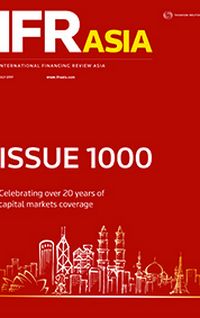The Philippines’ equity capital markets have minted several new billionaires over the past decade or so, but it was the modest listing of a lowly public utility in 2005 that started the flow.
The Ps5.1bn (US$94m) float of Manila Water in February 2005 was the country’s first major IPO since the Asian financial crisis. The stock jumped 16.9% and closed 6% higher on its first day of trading, helping build confidence for the far bigger float of Henry Sy’s SM Investments two weeks later.
“It was a very small deal but marked the return of Philippines to the capital markets,” said Lauro Baja, head of corporate client solutions for South-East Asia at UBS and one of the top dealmakers in the Philippines.
The Philippines’ equity market survived the Asian financial crisis in better shape than many of its neighbours, but was among the slowest to recover. Politically, the atmosphere was challenging following the ousting of President Joseph Estrada in 2001. However, by early 2006 investors had gotten hold of the Philippine story – great demographics, an English-speaking population and strong economic potential – and the trickle that began with Manila Water soon turned into a flood.
In the past investors had known only the Gokongwei, Sy and Ayala families, but from 2006 the newly minted billionaires included Andrew Tan, Enrique Razan, AL Gotianun and Manuel Villar.
The “re-IPO”, a public offering from a company with a small free float, was the big theme. Companies such as Universal Robina, Megaworld, Alliance Global Metropolitan Bank, Robinsons Land, Filinvest, Aboitiz Equity Ventures, International Container Terminal Services and Philippine National Bank capitalised on this concept. UBS was the sole foreign bookrunner on all these deals within an 18-month window, Baja said. Vistaland, Pepsi Cola Products and Aboitiz Power also launched IPOs during this period.
The global financial crisis in 2008 caused another lull, before share issues from Metro Pacific and Puregold Price Club in 2011 opened up the market once more. The need for capital, estate planning and a desire to monetise their investments brought more conglomerates into the equity market.
GT Capital’s Ps22bn IPO in 2012 and LT Group’s follow-on offer of Ps38bn in 2013 raised the bar further, with the latter still the Philippines’ largest equity issue. It was also the first Philippine deal with a formal cornerstone tranche. Again, both were managed by UBS.
Gaming companies were also popular with investors, and the likes of Bloomberry Resorts, Melco Crown and Travellers International sold shares in 2012–2013. This period also saw overnight block trades and top-up placements from Ayala Land, JG Summit and SM Investments. Large rights offering also came from BDO Unibank, Metrobank and Bank of the Philippine Islands.
Baja attributes UBS’s success in the Philippines to its commitment to the country and low turnover.
“The same people who did the deals in 2005 are doing the deals today. Many of the issuers are from the same family groups and we have been fortunate to maintain the strong relationship with our clients throughout these years.”
Bankers joke that one in every five years is a banner year in the Philippines’ equity capital markets. On that basis, another deluge of deals is soon due.
To view all special report articles please click here and to see the digital version of this report please click here .
To purchase printed copies or a PDF of this report, please email gloria.balbastro@thomsonreuters.com .


